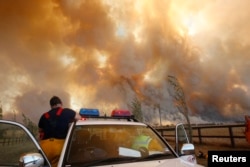Tens of thousands of Melbourne homes and businesses lost power Friday as air-conditioners taxed the power supply on what was forecast to be the hottest day in a decade for Australia’s second-largest city.
The Victoria state capital, with a population of 5 million, is set to reach 44 degrees Celsius (111 degrees Fahrenheit). That would be Melbourne's hottest day since Feb. 7, 2009 — a day of catastrophic wildfires that is remembered as Black Saturday.
That day, the temperature soared to 46.4 C (115.5 F). Wildfires killed 173 people and razed more than 2,000 homes in Victoria.
Scores of wildfires are raging in heat wave conditions across much of drought-parched southeast Australia, with authorities warning the fire risk is high.
Audrey Zibelman, chief executive of the Australian Energy Market Operator, which manages the national electricity grid, said three heat-stressed coal-fired generators had failed in Victoria and a fourth was expected to shut down Friday.
The grid began loading-sharing as temperatures climbed in the early afternoon, with 30,000 households and businesses at a time being switched off for as long as two hours so that supply could keep up with demand, Zibelman said. Essential services such as hospitals were quarantined.
Alcoa, the state’s largest power user, agreed to power down its aluminum smelter. Several other businesses also agreed to wind down their operators during the period of extraordinary demand to spare the city’s power.
Black Saturday had been the hottest day ever recorded by a major Australian city until Adelaide reached a searing 46.6 C (115.9 F) on Thursday.
The South Australia state capital of 1.3 million people — 640 kilometers (400 miles) west of Melbourne — beat its previous 80-year-old record of 46.1 C (115 F) set on Jan. 12, 1939, and records tumbled in smaller towns across the state.
The South Australian town of Port Augusta, population 15,000, topped the state at 49.5 C (121.1 F).
The Australian Open tennis tournament in Melbourne invoked its extreme-heat policy Thursday and closed the main stadium's roof during a women's semifinal match.
Bureau of Meteorology forecaster Rob Sharpe said he would not be surprised if this January becomes Australia's hottest January on record with heat wave conditions likely to persist.
Last year was Australia's third-warmest on record.






